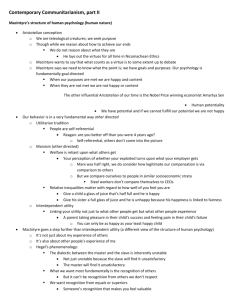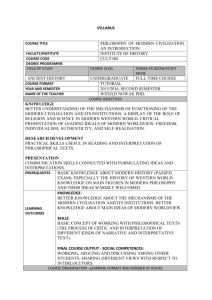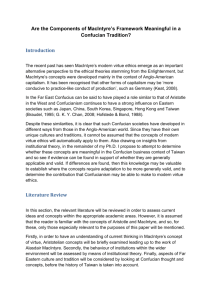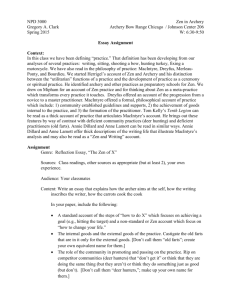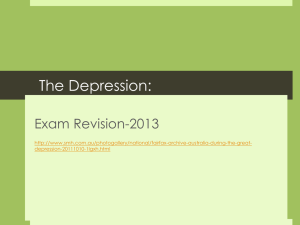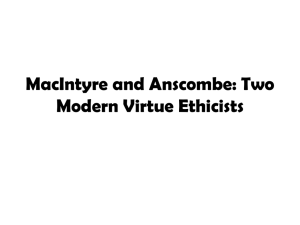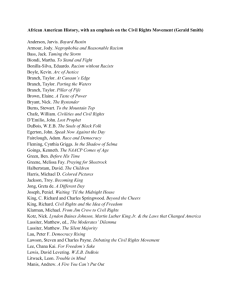Chapter Six (doc 86 KB)
advertisement
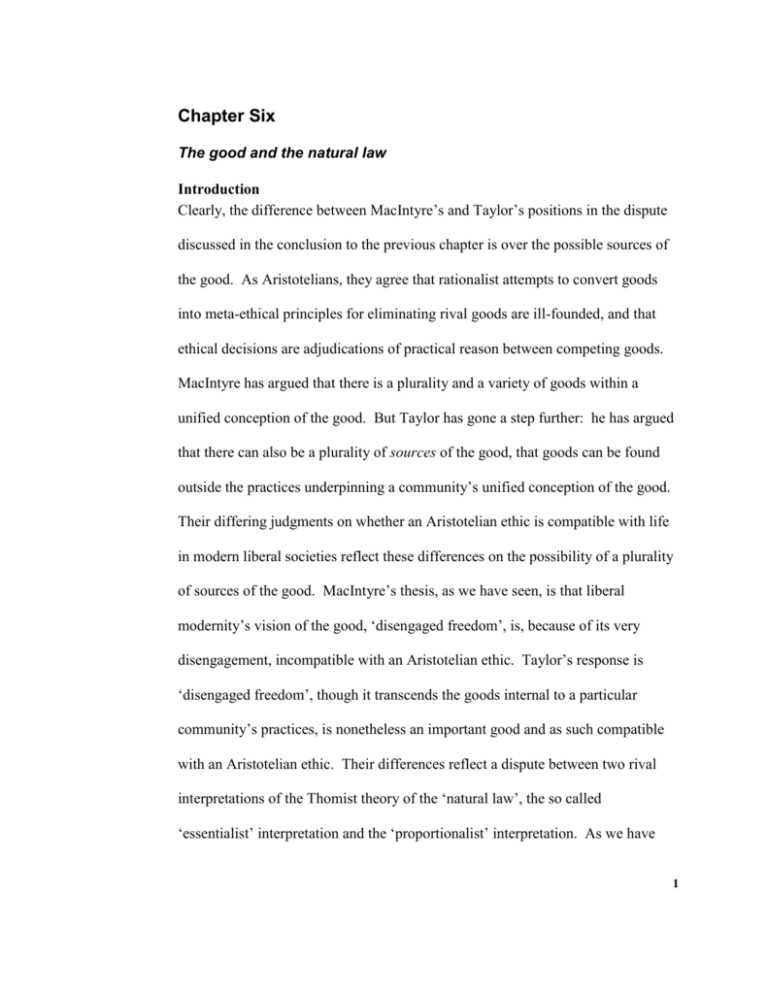
Chapter Six The good and the natural law Introduction Clearly, the difference between MacIntyre’s and Taylor’s positions in the dispute discussed in the conclusion to the previous chapter is over the possible sources of the good. As Aristotelians, they agree that rationalist attempts to convert goods into meta-ethical principles for eliminating rival goods are ill-founded, and that ethical decisions are adjudications of practical reason between competing goods. MacIntyre has argued that there is a plurality and a variety of goods within a unified conception of the good. But Taylor has gone a step further: he has argued that there can also be a plurality of sources of the good, that goods can be found outside the practices underpinning a community’s unified conception of the good. Their differing judgments on whether an Aristotelian ethic is compatible with life in modern liberal societies reflect these differences on the possibility of a plurality of sources of the good. MacIntyre’s thesis, as we have seen, is that liberal modernity’s vision of the good, ‘disengaged freedom’, is, because of its very disengagement, incompatible with an Aristotelian ethic. Taylor’s response is ‘disengaged freedom’, though it transcends the goods internal to a particular community’s practices, is nonetheless an important good and as such compatible with an Aristotelian ethic. Their differences reflect a dispute between two rival interpretations of the Thomist theory of the ‘natural law’, the so called ‘essentialist’ interpretation and the ‘proportionalist’ interpretation. As we have 1 seen, MacIntyre explicitly grounds his ethic in the ‘natural law’ as interpreted by Aquinas, and his account of Aquinas’s theory is ‘essentialist’. Taylor does not ground his ethic in Thomist ‘natural law’ theory, but his notion of ‘transcendent goods’ is consistent with the ‘proportionalist’ theory. In this chapter I want to adjudicate the dispute between MacIntyre and Taylor in favour of the latter insofar as Taylor’s theory is consistent with a ‘proportionalist’ understanding of the ‘natural law’. In order to do that, I need first to give an account of MacIntyre’s ‘essentialist interpretation of the ‘natural law’, and then to show how a ‘proportionalist’ account is superior. ‘Essentialist’ and ‘proportionalist’ interpretations of ‘natural law’ The ultimate ground of MacIntyre’s ethic is Aquinas’s ‘unified metaphysical theology’ (MacIntyre, 1988, p. 171), and in particular his account of the ‘natural law’ (MacIntyre, 1991a, p. 108). MacIntyre presents his account of Aquinas’s ‘unified metaphysical theology’ in chapters X and XI of his Whose Justice? Which Rationality? (1988)1. Aquinas’s theology is based on a unified conception of the good, pace Rawls who, as MacIntyre reminds us, regards such a conception ‘... as irrational, or more likely as mad’ (MacIntyre, 1988, p. 165 quoting Rawls 1971). But like Rawls, Aquinas, according to MacIntyre, also ‘... recognized the variety and heterogeneity of goods...’ (MacIntyre, 1988, p. 165), and, like Aristotle, he saw the unification of those goods as being accomplished within ‘the teleological order of the cosmos’ which is theologically specified (MacIntyre, 1988, p. 166). 2 Within that order, on Aquinas’s theology, human beings have their own specific telos. That telos, MacIntyre tells us (MacIntyre, 1988, p. 173), orients us to apprehend being and good: We do indeed, according to Aquinas, apprehend being as the most fundamental concept of theoretical enquiry and make explicit what we apprehend in the recognition which our judgments accord to the principle of noncontradiction. Similarly we apprehend good as the most fundamental concept in forming practical activity and make explicit what we apprehend in the recognition which our actions accord to the principle that good is to be done and evil to be avoided (MacIntyre, 1988, p. 173). In order to achieve that telos, human beings need a certain natural directedness (inclinatio) toward the forms of action it requires. Thus, the animal aspect of our nature directs toward the production and education of children ‘... to participate in the human forms of life’ (MacIntyre, 1988, p. 173), while the rational aspect of our nature directs us toward the pursuit of knowledge and above all knowledge of God. Practical reason, in deliberating about how one must act in order to achieve one’s good, comes to know the ‘natural law’. The ‘natural law’, for Aquinas, is not natural in the sense that human beings are supposed to be ordered by some kind of biological or mechanical necessity towards particular ways of acting. Rather the ‘natural law’ is a command of reason, and thus its necessity can only be moral: the law tells me what I must do, or not do, in order to achieve my good. The natural moral law is a participation in the divine law. In an explication of prudence, the virtue which in Aristotle’s and Aquinas’s theories enables us to order our actions in accordance with divine law, MacIntyre writes ‘...according to Aquinas the good legislator needs prudentia, but 3 that prudentia is exercised so that human law accords with divine law, more especially in respect of the divinely ordained precepts of the natural law’ (MacIntyre, 1988, p. 197). The ‘natural law’, according to Aquinas, is divided into primary and secondary precepts. MacIntyre explains: The precepts of natural law are themselves divided into the genuinely exceptionless first principles and the secondary conclusions immediately following from these, which do not vary from culture to culture any more than do the first principles, except when vice and sin have obliterated awareness of them, but which do require on numerous particular types of occasion supplementation in order to have right application (S.T. Ia-IIae, 94, 5) (MacIntyre, 1988, p. 195). For purposes of adjudicating MacIntyre’s dispute with Taylor over the possibility of ‘transcendent goods’, I do not need to detail these precepts. What is important for my purposes is MacIntyre’s alignment of himself with that school of interpreters of the ‘natural law’ which holds that ‘the essential nature of human beings’ (MacIntyre, 1988, p. 179) discloses to practical reason ‘... genuinely exceptionless first principles and the secondary conclusions immediately following from these, which do not vary from culture to culture any more than do the first principles...’. Aquinas, in short, believed that human beings, like all creatures, had a metaphysical constitution which he termed their ‘nature’ or ‘essence’. That nature or essence was immutable2. This ‘essentialist’ school of Thomist theologians, with which MacIntyre aligns himself, interprets the ‘natural law’ as a detailed set of absolute moral precepts to be apprehended by practical reason reflecting correctly on questions about one’s good. We can now see some of the consequences of this interpretation of the ‘natural law’ for MacIntyre’s dispute with Taylor. 4 On MacIntyre’s interpretation of the ‘natural law’, the content of that law, the good for each individual, is intrinsic to the natures or essences of human actions. It follows that on this view there can be no source of the good, no revelation of the content of that law, other than the essences of human actions. Since human actions are performed within practices, the intrinsic nature of those actions - the good, the content of the ‘natural law’ - is disclosed within our practices. Since natures or essences are fixed and immutable, the content of the ‘natural law’ cannot change. Occasional changes in the formulation of particular precepts of that law within the tradition of a community are to be explained, on MacIntyre’s interpretation, as changes in the relevant community’s understanding of the precepts concerned, not as changes in the law itself. On this view, the good cannot transcend the practices in which we discover it because the good consists in the essences of the actions which constitute those practices. Only if the good did not consist in the essences of human actions could it transcend the practices in which we discover it. From this analysis it is clear that MacIntyre’s inability to concede the existence of Taylor’s transcendent goods is due to his commitment to this essentialist interpretation of the ‘natural law’. Unless the supposed transcendent goods can be reduced to illuminators of our understanding of the good(s) already embraced by the (Thomist) tradition, they cannot, on MacIntyre’s theory, be goods. For MacIntyre, the core of the tradition is that the good is fully revealed, though we may not fully understand or recognize it, in our human nature or 5 essence as we come to know it by engaging in our various practices. But, it may be asked, even if MacIntyre’s rejection of the possibility of ‘transcendent goods’ is due to his essentialist interpretation of the natural law and the theory of justice which follows from it, what is wrong with that interpretation, and with MacIntyre’s theory of justice? The first difficulty with the ‘essentialist’ interpretation of the ‘natural law’ according to its ‘proportionalist’ opponents is that it assumes that the action regarded as intrinsically good can always be done. If a particular action is intrinsically good or bad, there can be no exception to our obligation to perform or not perform it. In crude terms, an action, that is by nature bad, is always bad, and we must therefore avoid it always. In an article asserting this ‘essentialist’ view against the ‘proportionalist’ one, William E. May, a prominent ‘essentialist’, writes: ‘The important thing for us to realize is that St. Thomas teaches that the very first principle of natural law requires that the whole range of human good is to be done and pursued, and that all human evil is to be avoided’ (May, 1991, p. 347)3. The difficulty with this general principle is that there can occur cases in which the intrinsically good action required on the essentialist account will have an evil effect. An example commonly found in Thomist literature is that of the pregnant mother found to have cancer of the womb. The operation necessary to remove the cancer will abort the pregnancy: the moral dilemma here is ‘Is it lawful to perform an action that, in itself, is morally good, but that would have a morally 6 evil effect?’ The traditional ‘essentialist’ response to this dilemma has been their ‘principle of double effect’. According to this principle, such an act may be performed provided (a) that the evil effect is not directly intended either as an end or as means, and (b) the reason for performing the act is proportionate to the evil effect to follow4. The opposing ‘proportionalist’ school of Thomist thought, represented by theologians such as Josef Fuchs, Charles E. Curran, Richard A. McCormick, and Timothy E. O’Connell, has difficulty accepting the distinction between a direct and an indirect intention on which this resolution of the dilemma turns. They prefer rather to admit that the actual historical condition of humanity is such that the good can never be fully achieved and thus some evil must be tolerated for the sake of a proportionate good. According to O’Connell, we determine what we ought to do by ‘... balancing the various ‘goods’ and ‘bads’ that are part of the situation and by trying to achieve the greatest proportion of goods to bads’ (May, 1991, p. 335 quoting O’Connell). On this view human actions, which in the absence of a proportionate moral good would be morally evil, become good in the presence of a proportionate moral good5. The act so elevated is characterised by ‘proportionalists’ as ‘premoral’ evil (May, 1991, p. 336 citing McCormick) or as ‘nonmoral’ or ‘ontic’ evil (Schindler, 1989, p. 295). On the ‘proportionalist’ view, the ‘natural law’ does not consist in a set of absolute laws divinely implanted in the nature or essence of human beings; rather, as we saw in our account of Fuchs’ interpretation in the last chapter (p. Error! Bookmark not defined.), human beings, having been constituted by God with divine power, are thus enabled to determine for themselves, in dialogue with their similarly 7 constituted fellows, the good and the laws which follow from it. Human ability to do the good, however, is, on the ‘proportionalist’ view, always limited by their historical circumstances, the role attributed to which is the source of the second difficulty associated with MacIntyre’s ‘essentialism’. The second difficulty with an ‘essentialist’ conception of the natural law, and thus with MacIntyre’s theory of justice, is that such a conception depends upon a superseded worldview: the so called ‘classicist’ worldview6. To say that this worldview has been superseded is not to make the arrogant and superficial claim that it is no longer in fashion. Rather it is to say that it has been displaced in that conceptual revolution commonly known as ‘the scientific revolution’. The ‘classicist’ worldview underpinned all the sciences including theology before the scientific revolution. The overthrow of this worldview therefore affects theology as well as the natural sciences. In order to appreciate its effects on the ‘essentialist’ interpretation of natural law, and indeed its force against MacIntyre’s critique of liberal modernity, we need to consider in a little more detail the contrast between the ‘classicist’ worldview and its more ‘historically-minded’ successor, as one moralist terms it (Curran, 1991, p. 264). On the ‘classicist’ worldview, reality is constituted by substances and natures whose essences are fixed and immutable. Since change can occur only in the accidents of things, history, being characterised by change, is but a succession of 8 transitory and superficial features of reality, and a knowledge of history contributes nothing substantial to our understanding of reality. In moral theology in general and in the study of ‘natural law’ in particular, according to leading Catholic moralist, Charles E. Curran, this worldview leads to a methodology which ‘... tends to be abstract, a priori, and deductive’; on this methodology, he writes, ‘... the first principles of morality are established, and then other universal norms of conduct are deduced from these’ (Curran, 1991, p. 265). Since essences are immutable, morality is basically unchanging and universal; the historical circumstances of a moral decision, being purely accidental, are only of peripheral relevance to its determination7. The problem with the ‘classicist’ view’s restriction of the human being to abstract human nature, according to Bernard Lonergan SJ, one of the leading Catholic philosophers and theologians of this century, is its neglect of ‘... people as they are’ (Lonergan, 1985, p. 3 emphasis added). In this condition, people ‘... apart from times of dreamless sleep, ... are performing intentional acts’ (Lonergan, 1985. p. 3 emphasis added). Intentional acts, in Lonergan’s philosophy, being ‘acts informed by meaning are precisely what gives significance to human living’; to neglect the acts by which human beings make their history is therefore, on Lonergan’s theory, to deny meaning to life, and ‘... to deny all meaning to life is nihilism’ (Lonergan, 1985, p. 4). Intentional acts, for Lonergan, express the manner of human engagement with the world. Such engagement takes place at a 9 range of levels, in acts of ‘...experiencing, imagining, desiring, fearing’; people, Lonergan writes: ... wonder, come to understand, conceive; they reflect, weigh the evidence, judge; they deliberate, decide, act (Lonergan, 1985, p. 3). In order to understand the natural law in a way that recognises human acts as what ‘gives significance to human living’, we have, on Lonergan’s view, to invert the order followed in the essentialist (‘classicist’) interpretation. The latter interpretation began with the nature of human acts, their timeless, universal and immutable feature; an interpretation more in keeping with a contemporary understanding of reality will begin with the concrete, historical particularity of human acts. In saying this, Lonergan does not wish to deny the existence of natures or of continuities within history. An historically minded interpretation of the natural law does see human beings as constituted in accordance with its primary precepts, as we saw in Fuchs’ account in the previous chapter. The concern of this interpretation is rather that the human call to do the good by shaping human history in the ways demanded and permitted by concrete historical circumstances be recognised as the meaning of that law. Contrary to the ‘essentialist’ interpretation of the ‘natural law’ embraced by MacIntyre, the goods it commands us to foster are only to be found in the most general sense in the essence of the law; human beings are called to discover and shape for themselves the goods in their concrete, particular, historical reality. Because the historically conscious interpretation of ‘natural law’ sees that law as a mandate to create, albeit by communal processes of the kind elaborated by MacIntyre, the good, its 10 adherents will expect that interpretation to be one evolving through encounters with novel phenomena and situations. Since ‘change and development’, as Curran points out, is central to ‘the contemporary understanding of reality’ (Curran, 1991, p. 269)8, grappling with what Taylor characterises as ‘transcendent goods’ will be an integral part of fulfilling that mandate. There is one obvious reply available to MacIntyre here. Whether or not he rejects the ‘historically conscious’ worldview in favour of the ‘classicist’ or ‘essentialist’ one, he could point out that even for Taylor the so called ‘transcendent goods’ have to be recognised as such by the relevant community, and integrated into that community’s conception of the good. In order to do both these things, the relevant community has to find a consistency between the candidate ‘transcendent goods’ and its understanding of its moral tradition. Even Israel, in one of Taylor’s most striking examples of a ‘transcendent good’, was, MacIntyre might argue, able to recognize as authentic the voices of the prophets condemning their ‘holocausts’ only in the light of the consistency of the condemnations with deeper elements in their tradition. Thus, if ‘disengaged freedom’ is to count as a ‘transcendent good’, it too must conform to the tradition’s conception of the good. MacIntyre could conclude by repeating his initial response to Taylor’s claim that, in MacIntyre’s words, ‘... there are goods and virtues which are independent of practices’: It can only be by considering each good and virtue alleged to be thus independent and showing that, in so far as it is a good or a virtue, it is not wholly independent of practices and, in so far as it is wholly independent of practices, it is not a good or a virtue (MacIntyre, 1994, p. 288-9). 11 Taylor’s ‘transcendent goods’ can never, on MacIntyre’s account of the good, be truly transcendent because they cannot be independent of the relevant community’s practices. But if my general alignment of Taylor’s notion of ‘transcendent goods’ with Lonergan’s and Curran’s ‘historically conscious’ worldview is correct, this reply misses the point of Taylor’s notion. That point is not, as MacIntyre construes it, that ‘transcendent goods’ are wholly independent of practices in the sense that the conception of the good acquired by adherents through those practices plays no role in their recognising ‘transcendent goods’ as such. Taylor’s point is rather that a community’s practices do not necessarily wholly capture the good that they disclose. Thus, it was not the practice of Israel which disclosed the good of the ‘pure heart’ but, in theological terms, the voice of the God who reveals himself as one calling them into a new phase of development. Past practices, and the entire tradition of which those practices formed a part, provided Israel with the knowledge necessary for them to recognize this voice as the voice of the God attested in that tradition, but their God revealed himself as one who could never be wholly captured in the practices of the tradition. To be sure of retaining whatever hold on the good their practices gave them, the people of Israel had to accept that the good transcended their hold, and that they therefore needed to be constantly alert to future disclosures. Expressed in MacIntyre’s terms, Taylor’s argument could be stated thus. ‘Essentialism’ and ‘historical consciousness’ are two rival 12 traditions of Christianity. ‘Essentialism’s’ relegation of change and development to the rank of ‘accidents’ has severely eroded its credibility as an interpretation of Christianity in an age in which change and development is a central feature of human experience, and consequently of the modern worldview. The ‘historically conscious’ school, however, has found grounds within the foundations of the Christian faith for interpreting it in the light of the contemporary worldview on which human beings are above all historical, and thus essentially subject to change and development9. Goods such as disengaged, free, rational agency, exalted in modern times, can thus be integrated into the ‘historically conscious’ tradition of enquiry because, although this good was not disclosed as such within the tradition itself but came from outside it, this good is nonetheless consistent with the tradition’s conception of human beings as historical, and of God’s self-revelation as continuing in history. Liberal modernity, on the latter tradition, does not have to be rejected by Christians in its entirety and a retreat beaten to Christian communities situated on the margins of liberal societies, as MacIntyre counsels. MacIntyre might reply that even if some ‘transcendent goods’ could be admitted, ‘disengaged reason’ is incompatible with any understanding of the Christian tradition: ‘Disengaged reason’ implies, as Rawls holds, that the good is nothing else but what the individual chooses to make it, and that, as Nietzsche taught us, its various defences ‘... in the morality of European society since the archaic age in Greece [have] been nothing but a series of disguises for the will to power ...’ 13 (MacIntyre, 1985, p.258). Indeed, MacIntyre might argue, to attribute the authority to determine the good to the human will is to attribute to that will the authority reserved in the Christian faith to God. Since such an attribution would be blasphemous, ‘disengaged reason’, he might contend, cannot be admitted as a ‘transcendent good’ by any interpretation of Christianity. But this reply supposes that there are no limits or guides to the authority of ‘disengaged reason’. Taylor has insisted that as a good rather than a meta-ethical principle, this good, ‘disengaged reason’, must be integrated with other goods embraced by the relevant individual, and that this individual discovers these goods in the practices of his or her community. The authority of individual ‘disengaged reason’ to determine the good is thus limited and guided by the conception of the good that he/she already accepts. The individual Christian may claim the authority to determine how Christ’s commandment of love ought to be implemented in a particular situation in his or her life, but he/she will not have the authority to determine that hate, instead of love, is the good in any situation. Thus understood, ‘disengaged reason’, contrary to the reply attributed to MacIntyre, is admissible to the Christian tradition as a ‘transcendent good’. MacIntyre might retort that if ‘disengaged freedom’ is interpreted, as Taylor suggests, to be limited in its disengagement by existing goods within the interpreting community, it is not the ‘disengaged freedom’ of liberal modernity 14 because it is not wholly independent of ‘all our practices’ as Taylor characterised ‘transcendent goods’. Liberal modernity, if this argument is correct, would thus have to qualify its defining notion, ‘disengaged freedom’, in such a way as to integrate it with existing practices in order to protect its status as a good within Taylor’s version of Aristotelian ethics. But, MacIntyre might conclude, such a qualification of this notion would transform it from a good in Taylor’s ‘transcendent’ sense to a good in MacIntyre’s practice-related sense. What is important to Taylor’s case for ‘transcendent goods’ in general and ‘disengaged freedom’ in particular is not its total independence of all practices but the origin of such goods outside those practices. Indeed, Taylor himself has insisted against modern rationalists that goods like ‘disengaged freedom’ are context-dependent. His point against both MacIntyre and modern rationalists is that the sources of the good are plural. Against MacIntyre, this point implies that genuine goods, such as ‘pure hearts’ in Israel, can be disclosed from outside our existing practices. Such goods can be disclosed in such sources as the words of the prophets, or the Gospel stories, or the reflections of great thinkers on the problems of the day as in the case of ‘disengaged reason’. Even though the relevant communities must find a consistency between the ‘transcendent good’ and the goods of their existing practices for the ‘transcendent good’ to become a good, Taylor’s point that the source of the ‘transcendent good’ in Israel lay outside the existing practices remains valid. 15 There is one difficulty with ‘proportionalism’ which must also be considered before considering the implications of this critique of MacIntyre’s position for the possibility of social justice. Thomas F. Schindler points out the application of the terms ‘premoral’, ‘non-moral’ and ‘ontic’ evil to aspects of situations, in which moral decisions might have to be, but have not yet been, made, suggests those aspects are ‘morally neutral’. It is only when acts such as ‘[k]illing and failing to respond truthfully and premarital intercourse’ become part of a moral decision that, on the ‘proportionalist’ view’, they ‘... seem to have moral import’. In Schindler’s opinion, ‘That means we basically live in a morally neutral world ...’ (Schindler, 1989, pp. 295-6), as distinct from a world in which some actions are always morally wrong. But Schindler here attributes to ‘proportionalists’ a position they do not hold. As May, a leading ‘essentialist’ opponent of ‘proportionalism’, points out, ‘proportionalists’ do not regard such acts as those referred to by Schindler as morally neutral. Referring to ‘... acts of deliberately willed abortion, directly intended infanticide, and even genocide and the deliberate devastation of entire cities...’, May admits that, according to Richard A. McCormick, such acts ‘... are morally wicked ... in the absence of a proportionate good, but they become morally good, despite the massive “premoral” evil they entail in the presence of a proportionate good’ (May, 1991, p. 336). Indeed, May acknowledges the 16 ‘proportionalist’ view that in practice no good could ever be proportionate to the evil involved in genocide or the devastation of cities. It is therefore not in fact the case, as Schindler asserts, that ‘proportionalists’ hold that acts of the kind referred to by both himself and May are morally neutral, and Schindler himself makes no case to the effect that ‘proportionalists’ are committed to this view by the logic of their position. Schindler therefore fails to substantiate his criticism of this position. Despite this failure, Schindler does contribute a valuable insight to this debate. Though critical of this aspect of ‘proportionalism’, Schindler is not himself an ‘essentialist’. Rather he proposes a Thomist ethic which acknowledges the historical character of moral decisions, and which exposes a sharp contrast between Aristotelian teleology and utilitarianism. A central feature of Schindler’s ethic is the thesis that human teleology is toward ‘... a vision of person, society, and in interaction’, and that this teleology distinguishes the role of consequences as moral criteria in an Aristotelian ethic from their role in utilitarianism: ‘... some types of behaviour, even though these may issue in some good results, are of a character that distorts our vision of what the self and the world should be like’ (Schindler, 1989, p. 297). On utilitarian principles any act, no matter how terrible it may seem, will be moral provided only it has as its consequence the greatest happiness on the greatest number. Since a teleological ethic is by definition one on which the morality of actions is determined by their orientation to particular 17 ends or consequences, it might be argued that an Arisotelian teleological ethic differs little from other forms of consequentialist morality such as utilitarianism. Schindler’s reply is that on his ethic, in contrast to utilitarianism, the range of acceptable consequences of human actions will be limited by that ethic’s definition of human ends. Our vision of what the human self and our world should be like will, he holds, make some acts always immoral. This insight is valuable and his method of defining ends and then constructing the rest of his system to fit those ends invites comparison with the approaches of fellow neo-Aristotelians, MacIntyre and Taylor. Schindler’s method is more a priori than MacIntyre’s in that it shapes a definition of virtue and applies it to an analysis of contemporary American society whereas MacIntyre purports to give an a posteriori account of the genesis of a virtue-based morality in that the account is couched primarily in social rather than philosophical or theological terms. Schindler’s vision includes a social, rather than what he sees in America as an excessively individualist, ethic, and a commitment to social justice and environmental responsibility. Expressed in Taylor’s terms, these elements of Schindler’s vision would be called goods, and as such they would be competing for their place in a community’s overall hierarchy of goods. Since my main criticisms of MacIntyre’s ethical theory have been based on Taylor’s argument for the possibility of ‘transcendent goods’ in general and for ‘disengaged freedom’ in particular, I need now to consider the consequences of those criticisms 18 for the possibility of social justice. What place, if any, can social justice hold in a hierarchy of goods on Taylor’s version of Aristotelianism? Consequences of this analysis for the possibility of social justice For MacIntyre, there can be no justice of any kind without a common good on which to base it, and there can be no common good without a community whose good it is, and from whose practices it is discerned. But, as we have seen, true communities for MacIntyre are so small and united in their common life and allegiance to the common good that they can only exist at the margins of modern liberal societies. Moreover, the conception of the good to which they are committed is, on MacIntyre’s interpretation, so much at odds with the values of liberal modernity that for its adherents even to enter public debate on major issues is to threaten their security in that allegiance by acquiescing in the terms of the debate set by their liberal rivals. With the exception of the forum provided by universities, MacIntyre’s disciples are counselled to eschew for the most part public debate and to concentrate on developing their own institutions as effective forms of practical witness to their conception of the good. Social or distributive justice is not only possible but also required within these institutions where it will take the form of observance of the rules (iura) for determining and assigning each his or her due for his or her contribution to the common good. Failure to follow these rules, MacIntyre explains, erodes the common good by rendering those deprived of their just share of some good impaired to that extent from making their 19 proper contributions to that good. In the absence of a community committed to a common conception of the good, indeed to that conception based on an ‘essentialist’ conception of the ‘natural law’, MacIntyre argues, the term justice is meaningless because it is this context from which it takes its meaning. Justice as conceived by Rawls, for instance, is pseudo-justice, according to MacIntyre, because it is detached from any conception of the good as its basis, and because it renders practical reason incoherent by grounding it in inherently unstable wants instead of in judgments about the good for me. Moreover, since there can, on MacIntyre’s theory, be no goods that are not at least ‘... partially defined by their relationship to practices and the common good’ (MacIntyre, 1994, p. 288), the possibility of sharing allegiance with other citizens of liberal societies to ‘disengaged freedom’ and to conceptions of justice based on such freedom is ruled out because ‘disengaged freedom’, as Taylor puts it, transcends MacIntyre’s Thomist conception of the good. But, as Taylor and others whom I have referred to as ‘proportionalists’ have argued, MacIntyre’s restrictions on conceptions of the good and justice, though formidably defended, are not the only possible interpretation of neo-Aristotelianism/Thomism. Indeed, MacIntyre’s interpretation of this tradition locks its adherents into a superseded ‘classicist’ worldview. Despite his admirable success in expressing neo-Aristotelianism in social and historical terms, MacIntyre’s version of this theory must ultimately be rejected because of its failure to take human historicity seriously enough. Essences, to 20 paraphrase Lonergan, only exist in the abstract; people exist in history. If ethical theories are to be appropriate for people ‘as they are’ (Lonergan 1985, p. 3 emphasis added), they must give full weight to the historical character of human moral life. MacIntyre makes a great contribution to our understanding of ethics in general and justice in particular by insisting with Aristotle that its constitutive concept is the good. But it is Taylor, Lonergan and the ‘proportionalists’ who teach us that the good can have a plurality of sources, and that people living in modern liberal societies, if they are to pursue the goods they discover, will need to negotiate, as well as bear practical witness to, understandings of the good with their fellow citizens. Then they may well discover not only that without entering community the pursuit of their goods would be literally impossible, but also that the survival of the form of common life needed for that pursuit depends upon their observance of some form of social justice. Conclusion An Aristotelian conception of justice has great advantages over the rival conceptions considered in this thesis. Its basis in a conception of the common good recognises that the very competition between individuals so lauded by Hayek depends upon the entry of those individuals into some form of community, thus into some commitment to justice to support the life of that community. Conceived in a manner that respects the dignity of the human person (MacIntyre) or even free, rational agency (Taylor), social justice poses no threat of the totalitarianism 21 feared by Hayek. Moreover, justice conceived as a means to the common good is open to review by the community whose good it is, and not a set of sacrosanct inherited rules to be tampered with at the peril of the relevant society, as Hayek would have us believe. An Aristotelian conception of justice has the advantage over meta-ethical theories such as Rawls’ of reducing so called principles of justice, which purport to trump all goods, to goods which must compete with other goods for allegiance. MacIntyre’s account of the historical/social process by which goods are integrated into a unified conception of the good is a distinctive contribution to our understanding of the nature of ethics. However, his Thomist version of Aristotelianism was found in this chapter to be based on an ahistorical, ‘essentialist’ interpretation of the ‘natural law’. If accepted, that interpretation would define the meaning of human life in terms of obedience to the laws laid down once and for all in their natures, and would deny them both flexibility and creativity in the moral actions shaping their lives. Based on an understanding of human beings in the abstract rather than ‘as they are’, MacIntyre’s conception of justice, on his own admission, offered no contribution to the solution of the problems of justice in modern liberal societies. But an Aristotelianism based on a ‘proportionalist’ interpretation of the ‘natural law’ and admitting transcendent goods such as ‘disengaged freedom’ offers a basis for negotiating the place of such freedom within a powerful case for recognising the extent to which liberal societies are inescapably also communities. Such an Aristotelianism would be a genuine foundation for the possibility of social justice. 22 Notes 1 See also (MacIntyre, 1991a). 2 Aquinas held that the secondary precepts of the natural law could change, but not the primary principles (prima secundae, q. 94, a. 5). 3 In an accompanying note, May refers to Summa Theologiae I-IIae, 94, 2 in support of this claim. 4 This is my translation of a typical statement of this teaching found in one of the traditional manuals of moral theology, the Latin for which is: Hoc [not imputing guilt to the agent] obtinet si: (a) effectus revera non directe intendatur nec ut finis nec ut medium: non enim sunt facienda mala ut eveniant bona (Rom. 3, 8); (b) adsit ratio proportionata istam actionem ponendi: proportionatam dico effectui malo secaturo (Aertnys and Damen, 1965, p. 70-1). For a recent discussion of this principle, see (Kaczor, 1998). Brian V. Johnstone points out, however, that the ‘proportionalists’ ‘… do not say that one may do (moral) evil that good may come of it. What they are discussing is why something is morally wrong in the first place’ (Johnstone, 1996, p. 3 of computer printout at note 11). 5 6 It was this shift in worldview that underpinned the conceptual shifts in all branches of theology which might be described in Kuhnian terms as ‘scientific revolutions’, and which underpinned the reform of the Catholic Church in Vatican II. This contrast between the ‘classicist’ and ‘historicist’ worldviews is especially, though far from exclusively, associated with the work of Jesuit philosopher and theologian, the late Bernard Lonergan. See especially (Lonergan, 1958, pp.128-34); (Lonergan, 1974a, pp. 1-10) and (Lonergan, 1974a, pp. 231-8). 7 One significant example of the consequences of this ‘classicist’ methodology in Catholic moral teaching is its application by Pope Paul VI to the issue of artificial birth control in his 1968 Encyclical Letter Humanae Vitae. The essence of the act of intercourse was defined by the Pope in terms of its physical structure which was held to be directed primarily towards reproduction. The moral conclusion he drew from that structure was that any artificial intervention in an act of intercourse to prevent the possibility of conception was against the natural law. The article by Curran referred to in this paragraph is an extended discussion of this teaching viewed from the perspective of the two worldviews under discussion (Curran, 1991). 8 Curran points out that it is not only contemporary theologians and philosophers who take this view but also the bishops of Vatican II. Acknowledging that the bishops ‘... do not officially adopt any worldview or methodology’, Curran nonetheless insists that ‘Vatican II definitely portrays reality in terms of a more historical worldview, and also employs a historically conscious methodology’(Curran, 1991, p. 267). This methodology is evident especially in one of the Council’s most important documents The Pastoral Constitution on the Church in the Modern World (Gaudium et Spes) which, Curran observes, ‘... does not begin with abstract and universal ideas of Church, society, state, community, and common good, but rather by scrutinizing the signs of the times’ (Curran, 1991, p. 267). Scrutiny of the ‘signs of the times’ has since become a formal part of theological methodology. 9 Vatican II in its entirety was a reinterpretation of the Christian faith in this ‘historically conscious’ perspective beginning with its definition of the church as ‘the pilgrim People of God’ in the Council’s most fundamental document The Dogmatic Constitution on the Church (Abbott, 1966, pp. 14-101). This thrust is even more fully expressed in another key document designed precisely to express the church’s role in history, The Pastoral Constitution on the Church in the Modern World (Abbott, 1966, pp. 199-308). The Council’s emphasis on the ‘historicity’ of the church and its mission is commented on in standard theological commentaries like Rahner’s Sacramentum Mundi and his Dictionary of Theology (Rahner and Vorgrimler, 1981), but its application to ‘natural law’ theory can be found in (Curran, 1991) and in other essays in the same volume. An important study of Catholic moral theology within an historical perspective is to be found in (Gallagher, 1990).

